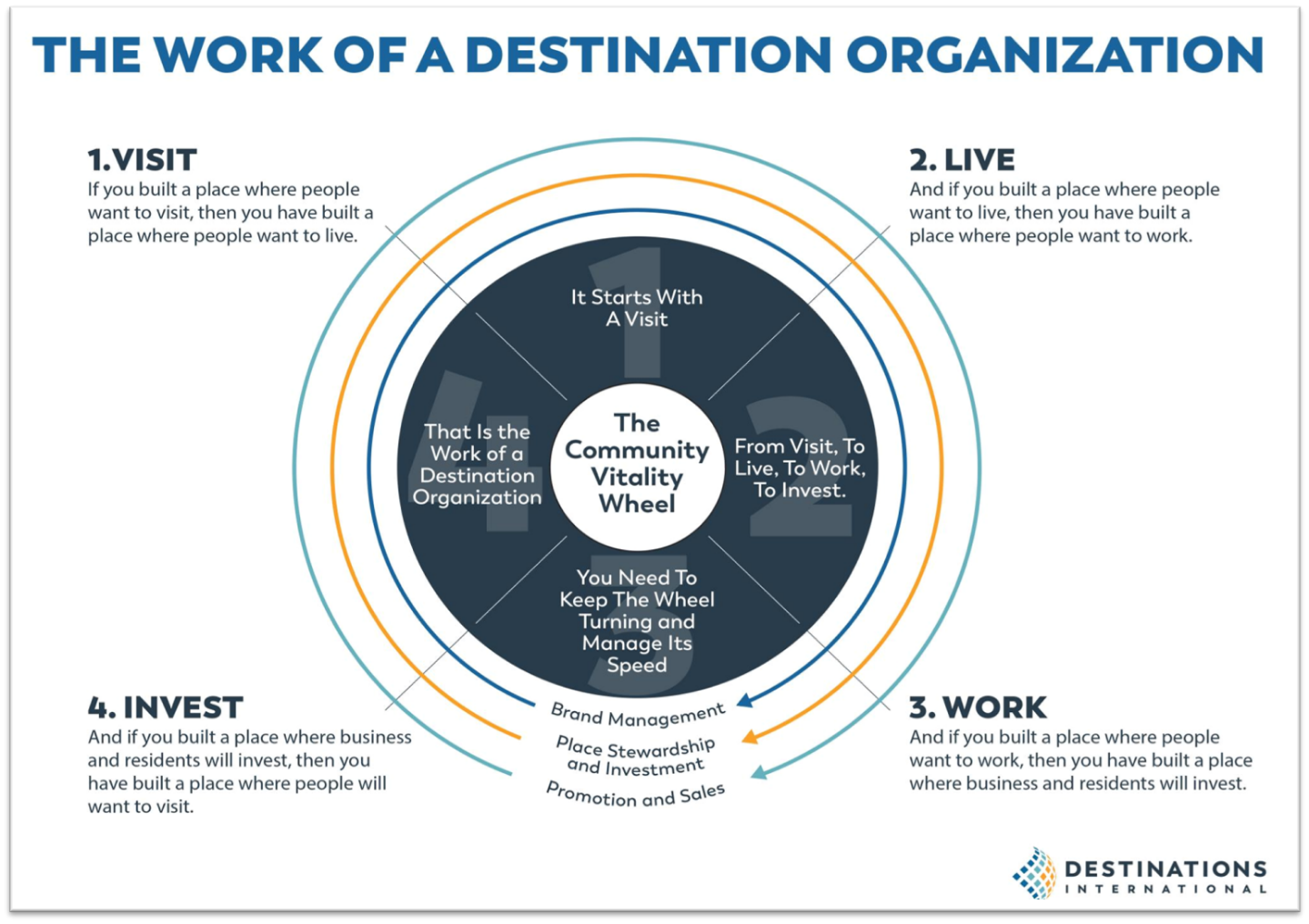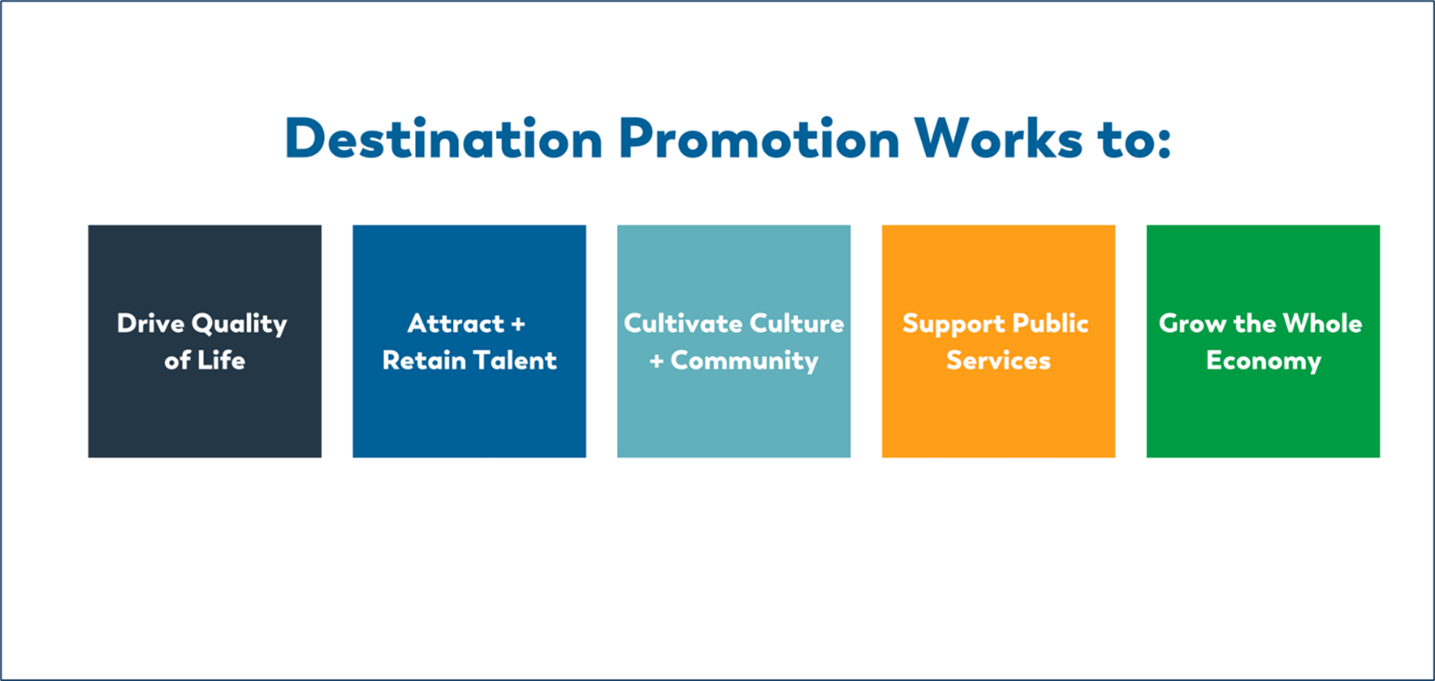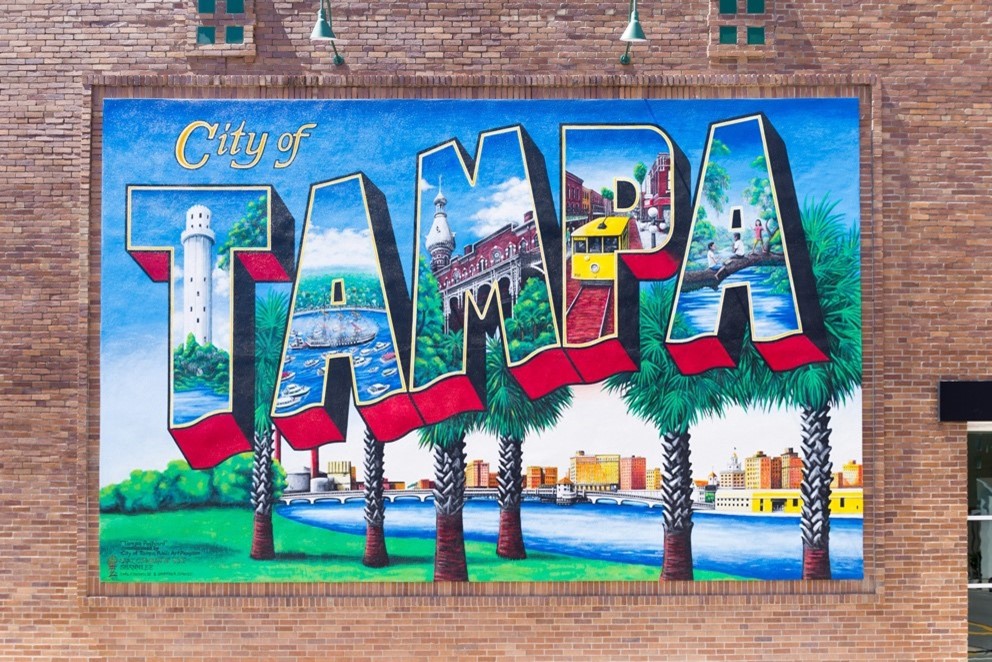
Destinations International had the opportunity to host a forum at the US Conference of Mayors and present the new Destinations International landmark report “Destination Promotion: A Catalyst for Community Vitality” to over 200 US mayors. We told them that the dividends of destination promotion have proven to positively drive quality of life, assist in attracting and retaining talent, cultivate both culture and a sense of community, support critical public services, and grow the whole economy.
Destinations International (DI) presented briefly two years ago at the US Conference of Mayors held in Reno, Nevada, USA. We presented the idea of a community-facing destination organization that articulated and defended a unified brand for the community. To underscore that point, we presented Houston as a case study of where that approach was being successfully implemented. Joining me on stage was Michael Heckman of Visit Houston and the city’s mayor at the time, Sylvester Turner.

This past weekend, DI hosted a forum at the US Conference of Mayors annual meeting to present the new Destinations International landmark report “Destination Promotion: A Catalyst for Community Vitality.” The meeting in Kansas City, Missouri, USA, hosted over 200 mayors from across the United States, plus their key staff members. We had the pleasure of speaking to the report and then moderating a panel that included Mayor John Giles from Mesa, Arizona, USA, Mayor Jane Castor, Tampa, Florida, USA, and Mayor Frank Scott from Little Rock, Arkansas, USA. All three are great examples of mayors who work closely with their destination organizations and see them as a catalyst for community vitality.

We shared our Community Vitality Wheel diagram with them as we explained a destination organization's key work and how it has a broader impact. We highlighted the role of brand management, place stewardship, infrastructure investment, promotion and sales. We stressed the role of destination organization professionals, the staff of a destination organization, in keeping the wheel turning at the correct speed. Not too fast, leading to depletion of resources, and not too slow, resulting in economic stagnation. As a reminder, downloadable Community Vitality Wheel diagrams are available on the Destinations International website.

We then introduced America’s mayors to DI’s landmark study, “Destination Promotion: An Engine of Economic Development,” which demonstrates the far-reaching positive impacts of destination promotion, extending beyond the tourism industry to benefit the entire community.
Using in-depth examples from ten North American destinations, this report reveals how investing in destination promotion acts as a catalyst for broader economic development, improved quality of life, and a stronger sense of place. The dividends of destination promotion extend far beyond the benefits accruing to visitor-related industries and their suppliers and have proven to positively drive quality of life, assist in attracting and retaining talent, cultivate both culture and a sense of community, support critical public services, and grow the whole economy.

Mesa Mayor John Giles of Mesa, Arizona, USA, discussed the link between being a successful tourism destination and a successful city. In his 2024 State of the City address, Mayor Giles underscored the importance of tourism and its impact on local businesses and job creation. He highlighted initiatives aimed at attracting more visitors and supporting local enterprises, reinforcing Mesa's reputation as a destination for both business and leisure.
We also discussed Mesa becoming the first Autism Certified City in the U.S. in 2019. This significant milestone was achieved through the collaboration of the city government, Visit Mesa, and the International Board of Credentialing and Continuing Education Standards (IBCCES). This designation highlights Mesa's commitment to creating an inclusive and supportive environment for individuals with autism and their families.
We also spoke about how they attracted Amazon to Mesa. I quoted John Pombier, Senior Manager of Community Engagement at Amazon, when he spoke about the unique attributes of Mesa and highlighted that the quality of life offered is a major driving force for the region’s workforce—with access to that workforce being a major part of any large corporate relocation and expansion decision. Pombier said, “Visit Mesa is developing the environment and the infrastructure that makes people want to come to Mesa.”
Finally, we spoke about the effect of successful branding. Branded as “City Limitless,” Mesa's branding strategies guarantee that travel inclusion is at the forefront of everything the organization does. Mesa is on a mission to become a recognized leader in travel accessibility. The brand's "Limitless" campaign, highlighting accessibility and inclusivity, signals a change in the organization's inclusive image. That is reflected in Amazon’s decision to relocate to Mesa.

With Mayor Jane Castor of Tampa, Florida, USA, we were speaking with another strong advocate for our industry sector, recognizing its critical role in the city's economic and social development. In her last inaugural address, she led with the point of maintaining Tampa’s identity as a friendly, welcoming city that embraces our diversity and differences as we grow with each passing day. We spoke about this at length.
She also has an amazingly close working relationship with Visit Tampa, which we explored. She explained this as a requirement for a connection between a strong visitor economy and a strong city economy overall.
We also spoke about how meetings, conventions and special events play a large part in creating an image of a destination. It is an arena that Tampa has been successful in. Florida, in general, has had challenges in this area as it has been a center for political culture wars. In response to the NAACP travel advisory, she personally assured prospective visitors they would be received with “open arms.” The city did extensive reach out to many convention groups to, as Mayor Castor stated, “make sure they understand the reality of Tampa’s welcoming climate.” Tampa has succeeded in keeping and growing every piece of business.

Mayor Frank Scott of Little Rock, Arkansas, USA, explored how he stated in his first State of the City address, "As your mayor, I promise that I will do everything in my power to unify our city, stimulate job growth, and strengthen our economic standing in the region." But before that speech, Mayor Scott brought together a group of civic leaders in a public CEO roundtable that included the Port Authority, the Water Reclamation folks, the Water Utility, the Airport, the Library System, the school district, and most importantly, the Little Rock Convention and Visitor's Bureau. In other words, he gave the CVB a seat at the table. Recently, in his State of the City address, Mayor Scott praised the Little Rock CVB as a major force as he listed a whole list of new company locations and expansions in Little Rock.
We also spoke about how, early in his term, he worked with the CVB to launch the River Market Entertainment District. The River Market district is the lifeblood of Little Rock's downtown scene. It is a place to do business, grab a marvelous meal, meet up with friends, or catch some great Arkansas live music. Mayor Scott understands the benefit of investing in projects like this that are targeted not only at visitors, but locals as well. This supports his goal of unifying the city, stimulating job growth, and strengthening the economy.
A vigorous question-and-answer session followed as the mayors and city officials sought to learn more. It was good to be in a room where the discussion was about leveraging destination promotion as a force of good in a community.
Like many of our serious advocacy initiatives, our work with the US Conference of Mayors is a long game. We have made progress in highlighting the work of destination organizations. As we expand this outreach to other organizations over the next two years, time will tell if this develops into a real relationship where we can support our member destination organizations from “above” or if we seek other approaches. That said, we do not have all our eggs in one basket. With unveiling the full first element of the Destination Effect Campaign at the Annual Convention and the second element at Advocacy Summit this fall, we will be pushing information out to support you through numerous channels. We will build on that even more this fall as Advocacy Summit comes around and we introduce our grassroots campaigns.
Just a reminder that the Catalyst report was created for Destinations International by Tourism Economics, Longwoods International, Clarity of Place, and MMGY NextFactor. The report was underwritten by a grant from the Destinations International Foundation. The report features case studies of the following North American destinations: Champaign, IL; Chattanooga, TN; Fort Myers, FL; Great Lakes, MI; Houston, TX; Mesa, AZ; Ottawa, ON; Puerto Rico; Seattle, WA; and Victoria, BC. The report is currently available on the Destinations International Website as a member benefit. However, at our Annual Convention in July, we will release the report to the public on our new public-facing website aimed at elected officials, public policy leaders, members of the general public, and the media. Please consider attending the Annual Convention and Advocacy Summit and subscribe to our newsletters to stay informed about this initiative.
Submit Your Thought Leadership

Share your thought leadership with the Destinations International team! Learn how to submit a case study, blog or other piece of content to DI.


